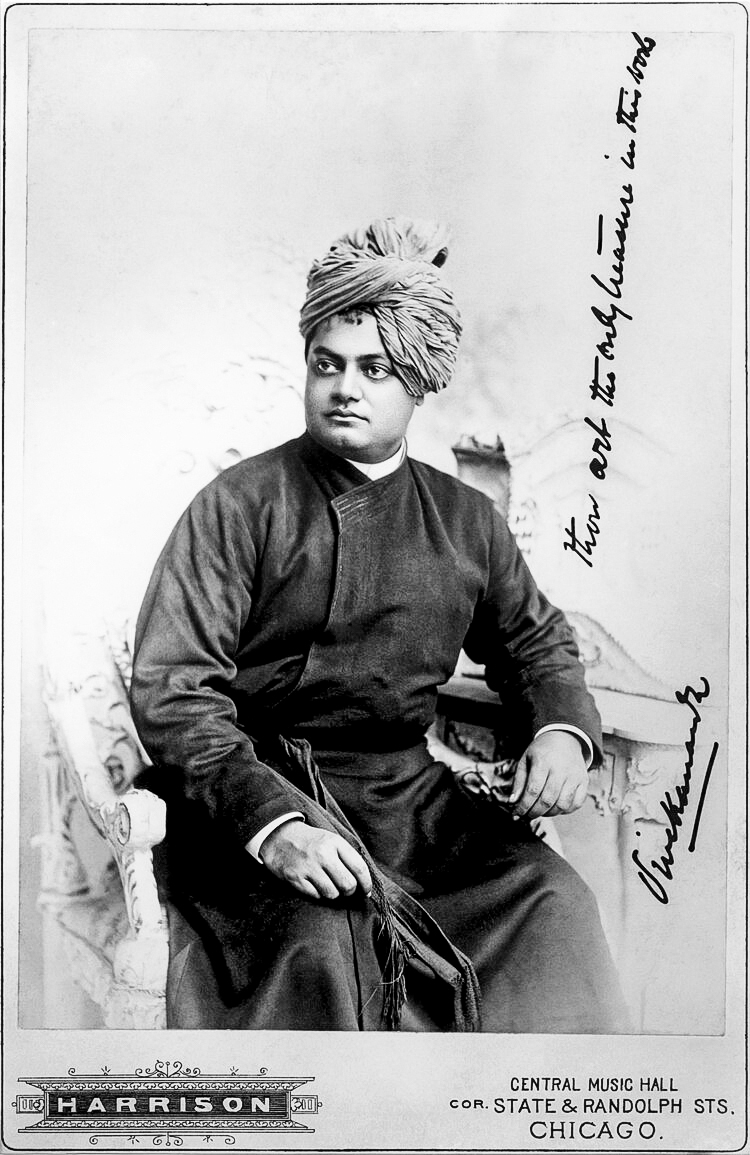Vivekananda’s talent for amplifying ancient wisdom to a globalized world takes on new urgency with emerging technologies.
This week will mark one hundred and thirty-one years since Swami Vivekananda electrified the World Parliament of Religions in Chicago with his opening speech reintroducing Hinduism to the world—a watershed moment for both Indian nationalism and Indian spiritual traditions alike. Vivekananda’s words launched Indic thought to newfound global recognition, offering timeless wisdom to a world shocked by rapid transformations in the 13 decades since. Now that humanity is grappling with another epochal transformation in the form of artificial intelligence, the time is again ripe for a Vivekananda-like voice to illuminate the global conversation.
Since Vivekananda, Indian traditions’ track record of impact on issues related to technological change has been pronounced. As the world grapples with the spectre of AI-powered weapons—evoking frequent comparisons to the nuclear revolution in war—the role that the Bhagavad Gita played in the moral calculus of the father of the bomb, Robert Oppenheimer, easily comes to mind. So also does Gandhi’s wide-ranging philosophy of nonviolence that has inspired leaders around the world, from Martin Luther King, Jr. to Nelson Mandela. Deeply rooted in Jain and Hindu thought, many of Gandhi’s insights on violence could offer clarity for a world quickly sliding towards a future of autonomous weapons and machine-speed conflict.
Grappling with looming threats of AI-powered labour automation, too, has notable antecedents in India. When British mass textile production threatened to ruin the work and livelihoods of Indian weavers, Gandhi developed a set of spiritually-inflected practices both to assert independence from the colonial economy’s growing textile monopoly and to highlight the dignity of the weaving vocation. Gandhi’s vision is still popular across India in the form of khadi—a rich source of thought and practice to address some of the dehumanizing aspects of AI labour disruptions in the future.
Then there are the overarching fears of large, powerful AI companies gaining unchecked power over societies and potentially turbocharging surveillance capitalism. Once again, the Indian voice has much to teach the world from its unique experience resisting the British East India Company’s domination.
The list of goes on, related to the fact that many of India’s bygone spiritual luminaries saw part of an independent India’s mission to the world as championing an alternative to Western societies’ pattern of tech-powered exploitation. Much of Gandhi’s independence manifesto, Hind Swaraj, was dedicated to proposing a more humane approach to technology in a potent critique of Western materialism that has echoes across numerous Indian thinkers: from Rabindranath Tagore, to Sri Aurobindo, to Deendayal Upadhyaya. It is no surprise, then, that India is already home the world’s most innovative experiment to make the arduous data work that powers much of AI empowering rather than extractive.
But if AI proponents are right about the magnitude of disruptions that AI will cause, Indian traditions’ insights on more esoteric issues may prove even more salient.
Hinduism’s distinctive focus on consciousness, for instance, would be especially valuable to the academic debate emerging on whether or not AI systems can develop conscious faculties—and what to do if so. Indian Sufism’s emphasis on physically rooted, communal experiences could be instructive as ever-more-sophisticated AI capabilities pull communities further online into disembodied isolation.
The homeland of Buddhism likely bears important messages on mindfulness as new, non-human minds come online—exacerbating trends towards ever more tech-induced anxiety. And strange as it may seem, the many centuries of commentary on “artificial life” and other robot-like beings rife in Indian lore is suddenly taking on new meaning as technologists and ethicists struggle to discern how humanity should engage with emotionally sophisticated robots.
Finally, there are structural reasons why a robust moral conscience on AI from India would be a welcome development for the broader world.
India is poised to be a focal point in the development of AI in the years ahead, with a major role to play in building out the world’s AI future.
Additionally, though the Chinese tradition of thought has conventionally acted as another counterbalance to Western perspectives on momentous issues, today China has committed to accelerating AI development in the service of tyranny and even crimes against humanity.
India has the unique potential to provide a much needed alternative to the excesses of American AI on one side, and a bulwark against the dangers of authoritarian Chinese AI on the other.
Reviving a Vivekananda-like voice from India will not be simple. In recent years, a steady stream of reportage on violence towards religious minorities across India has done much to erode the enlightened image of India that Vivekananda helped to establish. Even so, there is no question that India remains home to a wealth of robust spiritual and philosophical traditions that could be vital to navigating the many challenges that AI is presenting to humanity. Just as the British government is angling to make the UK an international focal point for AI safety, so also India’s government, civil society organizations, and religious leaders could turn India into a leader in global normative discussions on AI. If Vivekananda’s experience is any guide, the world would greatly benefit from robust Indian voices on the momentous AI transformations ahead.
Bill Drexel is a Fellow in the Technology and National Security at the Center for a New American Security (CNAS), a Washington, D.C.-based think tank. You can follow him on X at @bill_drexel.

